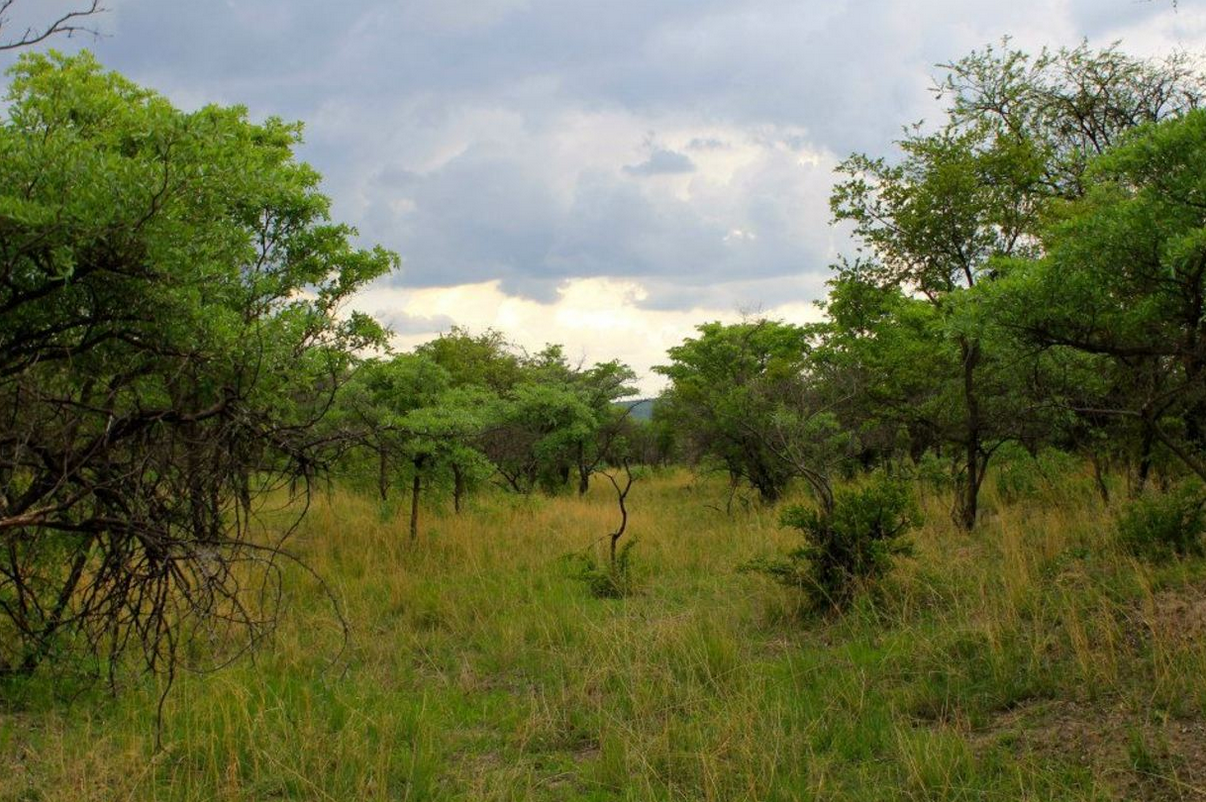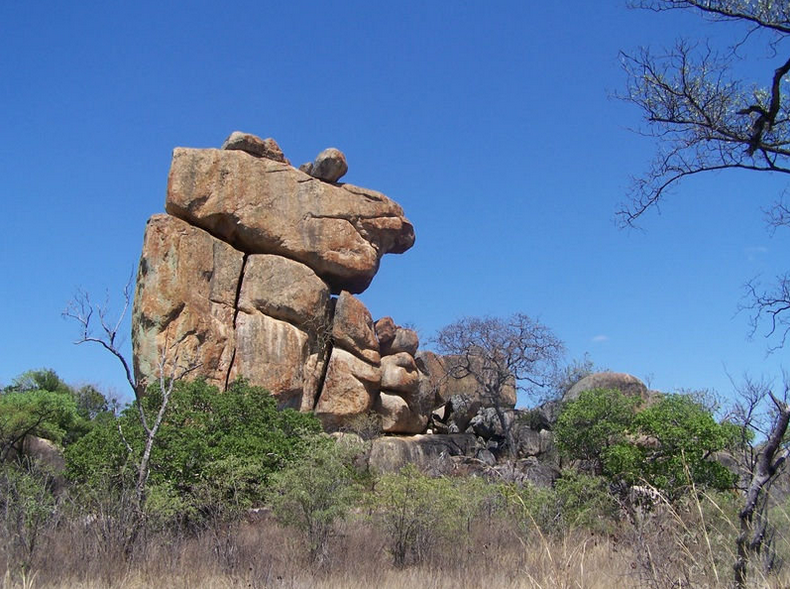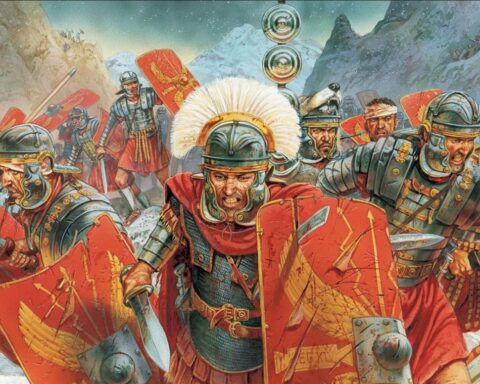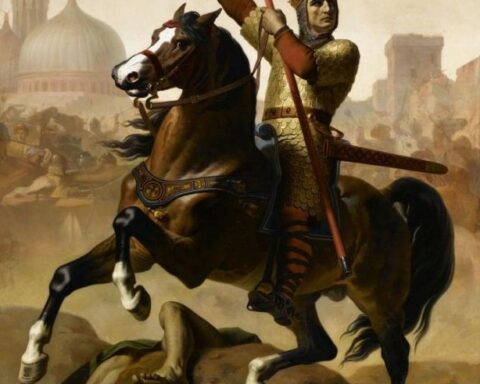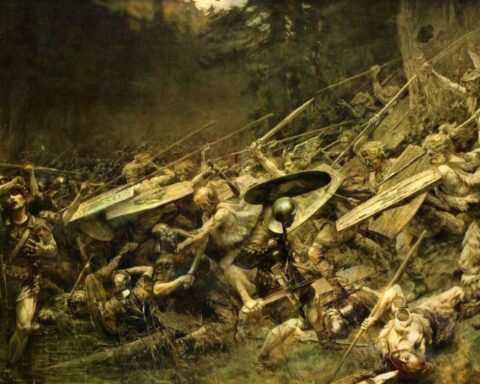Editor’s Note: The following comprises the twenty-fifth chapter of Sunshine and Storm in Rhodesia, by Frederick Courteney Selous (published 1896). All spelling in the original.
CHAPTER XXV
Shortly after the return of Colonel Napier’s column from the Insiza district, Major-General Sir Frederick Carrington reached Bulawayo with his very able and carefully-chosen staff, and at once took over the command of all the forces in Matabeleland. And here I ought perhaps to close my narrative, which I only intend to be a history of the efforts made by the colonists themselves to suppress the native insurrection, before the arrival in Matabeleland of the relief forces sent up to their assistance. However, at the risk of wearying my readers, I will ask them to have patience yet a little longer until I bring my story up to the date of the disbandment of the Bulawayo Field Force. Some time before the return of Colonel Napier’s column, the force raised by Colonel Plumer (of the York and Lancaster Regiment) for the relief of the colonists in Matabeleland had reached Bulawayo, and had already had a successful engagement with the rebels, whom he had dislodged from the positions they had taken up on the Umguza, some twelve miles from Bulawayo, to which they had retired after having been driven from the immediate vicinity of the town by the sortie under Captain Macfarlane on 25th April.
As a detachment of the Bulawayo Field Force and some of Colenbrander’s colonial natives took part in this expedition, I will, before proceeding further, give a short account of what took place. Acting under instructions from headquarters, Captain Knapp of the Bulawayo Field Force left Bulawayo at 10 P.M. on the night of 24th May in command of a detachment of forty men of Gifford’s Horse, with orders to report himself to Major Watts at Government House. On his arrival there the latter officer was found to be in readiness to move with the men under his command, and at about 11.30 P.M. the whole force marched in a north-westerly direction, holding a course across country between the Umguza and Khami rivers, whilst at the same time Colonel Plumer moved out of Bulawayo with another column, taking a line parallel to the course followed by Major Watts. During this night march Captain Knapp was in command of the advance, himself leading the one detachment of Gifford’s Horse on the right front of the column, whilst Lieutenant Warwick led the other half on the left. Colenbrander’s boys under Lieutenant Mullins were placed in the centre of the advanced line.
At about 2.30 A.M. Captain Knapp came suddenly in contact with the enemy’s outposts, who immediately opened fire on his party in the darkness. Captain Knapp at once dismounted his men and kept the rebels from charging by pouring volleys into the thickets where they were concealed. He was soon joined by Lieutenant Warwick and the Colonial Boys under Lieutenant Mullins, but it was not until Major Watts had come up with the main body and the Maxim had been brought into action that the enemy’s fire was completely silenced.
When the firing commenced, Colonel Plumer and his men were not very far off on the left flank, and their course was at once directed towards the spot where the engagement appeared to be proceeding. Thus the two columns joined forces soon after the enemy had retired, when a square was formed, and a good watch kept during the remaining hours of darkness. However, no further attack was made.
During the first attack, Mr. Hamilton, who was acting as galloper to Captain Knapp, was shot through both legs, whilst one of the Colonial Boys was badly wounded and several horses killed.
At daylight the following morning Captain Knapp and Captain Coope were sent out to look for the enemy, and the latter officer coming across a small party of them, he at once attacked with the force under his command, consisting of twenty white men and some of Radikladi’s Bamangwato natives, and drove the rebels back on their main body, which was found to be in a strong position amongst some thickly-wooded ridges about two miles to the west of Colonel Plumer’s camp.
At about half-past seven or eight o’clock the whole column was moved forwards to attack them, Captain Coope’s Scouts being in advance on the right, whilst Captain Knapp with the troopers of Gifford’s Horse occupied a similar position on the left. These two officers, after galloping to the foot of the first ridge occupied by the rebels, there dismounted their men, and then in the face of a heavy fire, led them on foot most gallantly against the hidden enemy, whom they succeeded in driving from their most advanced position.
In this attack two of Captain Knapp’s men were severely wounded, Sergeant Peacock being shot in the stomach, whilst Trooper Slowey had his right leg so badly shattered that amputation of the limb was found necessary.
The enemy’s first line of defence having been taken in this brilliant manner by the advance guard, the whole column under Colonel Plumer then came into action, and the rebels were driven from three densely-wooded ridges successively into the open valley of the Umguza, and were then pursued for a distance of three miles. When the pursuit was over, the horses were off-saddled on the bank of the Umguza and allowed to rest until 2 P.M., at which hour a start was made for Mr. Crewe’s farm of Redbank on the Khami river, some sixteen miles from Bulawayo, where it was believed that a large impi was camped in a very strong position. Captain Knapp now took charge of the right-hand section of the advance guard, and Captain Coope with his Scouts was placed on the left.
After having proceeded for about two hours, the latter officer sent a messenger to Captain Knapp to inform him that the enemy were in force on his left. They then joined forces and attacked the Kafirs, who were in a strong position on a wooded hill, to reach which two deep gullies had to be crossed under a very heavy fire. Here one of Coope’s Scouts was shot dead (Trooper Hays), whilst Mr. Gordon Forbes, who had accompanied the expedition as a volunteer, had a very narrow escape. He had crossed a dry gully with four of Captain Coope’s Scouts, when Kafirs showed themselves on either side at a distance of only thirty yards and fired on the white men. Mr. Gordon Forbes’ horse was shot in two places, and, falling with him, pinned him to the ground, the men who were with him retreating under the heavy fire, and had not some more of Coope’s Scouts come up and pulled him out he would undoubtedly have been killed. At this time, too, one of Radikladi’s boys was wounded in the face and another horse killed. The main column then coming up, the enemy were driven from their position and pursued through the bush till dusk, Colonel Plumer taking up his quarters for the night in the camp on the top of the hill from which the rebels had been driven.
On the following day scouts were sent out to endeavour to discover the position of the enemy, but no trace of them could be found, so, as the horses were very much knocked up, a return to Bulawayo was decided upon. During these skirmishes Captain Knapp lost five horses, in addition to the two men of his troop who were badly wounded, whilst Captain Coope also had several horses killed. These two officers and their men, being always in advance of the main column, naturally got the lion’s share of the fighting. They were both thanked for the gallant way in which they had led their men by their commanding officer, Colonel Plumer, who also complimented Mr. Maurice Gifford on the excellent service rendered by the troop of horse which bore his name.
During the first week in June, General Carrington determined to send out three patrols simultaneously with the object of thoroughly clearing the country of rebels to the west, north, and north-east of Bulawayo, before making an attack with the combined forces on the impis of Babian, Umlugulu, and Sikombo, who, it was known, had taken up strong positions in the Matopo Hills, from which they could only be driven with great difficulty and at the expense of a heavy loss of life on the side of the attacking party. Thus, towards the end of the week Colonel Plumer proceeded with a force of some 600 men to the Khami river, the course of which stream it was his intention to follow to its junction with the Gwai, whilst on Friday, 5th June, Captain Macfarlane got off with 300 mounted white men and 100 Colonial Boys for the Umguza, which he was determined to thoroughly clear of rebels along its whole course. Mr. Cecil Rhodes, Sir Charles Metcalfe, and Mr. Weston Jarvis accompanied the latter force.
Both these patrols were unsuccessful in coming up with any large body of the rebels, who dispersed and fled as the white men advanced. Thus, although some kraals were burnt and a good deal of grain taken and destroyed, no decisive engagement took place, and no heavy blow could be dealt at the ever-vanishing foe. Colonel Plumer’s column got back to their quarters on the Khami river on Wednesday, 24th June, whilst Captain Macfarlane’s men did not return to Bulawayo until Friday, 3rd July.
Before these patrols left, Colonel Beal, who it may be remembered had parted company with Colonel Napier at the Insiza river, reached Bulawayo and formed a laager about two miles out of town to the right of the main road to Salisbury. It had been arranged that on the morning after Captain Macfarlane got away with his men to the lower Umguza, another patrol was to leave town under the command of Colonel Spreckley for the purpose of establishing forts at Shiloh and Inyati, and to this patrol I had been attached with a few of my men, the majority of my troop being stationed at Fort Marquand.
Every preparation had been made for an early start on the Saturday morning, when late on Friday evening a report came in that there was a large impi camped on the Umguza, at the ford on the main road to Salisbury. It appeared that Sir Charles Metcalfe and the American Scout Burnham, who had been riding out to Colonel Beal’s camp, having missed their way in the dark, had ridden down the main road to the Umguza, and had there seen a line of camp-fires, extending over half a mile of ground, along the wooded ridge beyond the river, which could betoken nothing else but that a Matabele impi had taken up its position there. This news that a large impi was within six miles of the town having been confirmed by scouts sent out later on during the Friday night, Colonel Spreckley received orders to make an attack upon it on the following morning with all the mounted men he could muster in town, supplemented by the contingent under Colonel Beal. By nine o’clock a force of some 200 mounted men with three guns was ready, and forthwith set out for the Umguza. This force was composed of the Scouts under Captain Grey, a large contingent of Africanders under Captain Van Niekerk, thirty men under Captain Brand, and fifteen of my own troop which was all for which horses could be found.
On reaching the rising ground about a mile on this side of the Umguza, we found the Salisbury men drawn up all ready waiting for us, and they informed us that they had been watching the Matabele for some time past, and had seen them leave the camps in which they had slept in a very leisurely way and take up their positions in the open bush behind, where they were waiting for us.
They had not to wait long. The Africanders under Captain Van Niekerk were ordered to cross the river about half a mile below the ford, which they did at the same time that the remainder of Colonel Spreckley’s force and the mounted men of the Salisbury contingent crossed by the main road, the latter then deploying to the left.
At this time we were hidden from the Kafirs by the slope of rising ground behind which they had retreated, but when this was crested they were seen in the bush little more than a hundred yards in front of the foremost horsemen. The order was at once given to charge, on which a whirlwind of horsemen bore down on them, Grey’s Scouts and Brand’s men being in the centre, the Africanders on the left, and the Salisbury men on the right.
On this occasion the Kafirs must have been quite 1000 strong, spread out in skirmishing order through the open bush in face of the long line of advancing horsemen, yet they never stood for a moment, but were seized with a panic just as the smaller number of their compatriots had been when charged at Thaba Induna, as I have already related. In the same way as these latter, they fired a hurried ill-aimed volley and then turned and ran. In the chase which followed, a large number of them were shot down, and the pursuit was only abandoned when the fleetest-footed amongst them had gained the shelter of the belt of thick bush which runs down from the western side of Thaba Induna towards the Umguza.
I am of opinion myself that the Matabele lost more heavily on this occasion than at any other fight during the campaign, for the very reason that it was not a fight but only a pursuit in which the natives were killed as fast as they were overtaken. Just as on the day at Thaba Induna, so on this occasion the panic-stricken savages accepted death when the horsemen came up with them without making any attempt at resistance, except in a few instances. One man turned on Trooper Davey of Grey’s Scouts and shot him through the thigh with an old musket at close quarters, the large bullet smashing the thigh-bone and necessitating the amputation of the limb; whilst another, leaping out of a bush, rushed on to Trooper Hamilton of the Salisbury contingent and stabbed him in the right side, the assegai entering his liver. Hamilton wrenched the assegai out of his assailant’s hand and then shot him. My old friend, Mr. F. C. Farley of Grey’s Scouts and a well-known figure in the Bulawayo of to-day, as he was also in the native kraal of Lo Bengula many years ago, had too a very narrow escape. He had dismounted to shoot a Kafir running a short distance in front of him, when the latter turned and rushed at him shaking his shield in front of him. Farley luckily carried a double-barrelled rifle, for he missed the Kafir with the first shot, and only brought him down with the second barrel when his assailant was so near him that his assegai struck the ground close to his feet. Two other men were slightly wounded, but these were the only casualties on our side, whilst the loss sustained by the Matabele was very heavy, not only in number, but in the rank of the men who were killed, for it was naturally the young and nimble who were able to make good their escape, whilst the greater part of the older men were overtaken and slain. Some of the latter, however, outlived this fatal day by hiding themselves in the midst of thick bushes.
That this impi should have dared to come close up to Bulawayo and take up its quarters at a point on the Umguza where the bush was not nearly so thick as it is farther down the river, at the point where several large impis had already tried conclusions and failed to hold their own against the white men, certainly took everyone by surprise; but since then several hundred men of this impi have surrendered to Mr. W. Fynn, and we now know that when they approached Bulawayo they did so under the superstitious belief that their enemies would be delivered into their hands by the Umlimo, and that they would be able to kill them all without any loss to themselves.
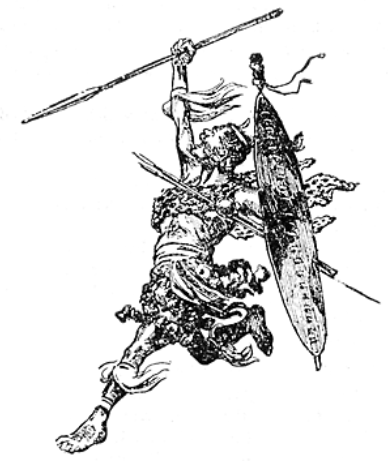
The story is as follows: Since the outbreak of the rebellion there has appeared amongst that section of the insurgents to which the defeated impi belonged a man who professes himself to be the prophet and mouthpiece of the “Umlimo” or invisible spirit. This man, it is said, possesses the power of throwing himself into an ecstatic condition, under the influence of which he swallows stones, rolls on the ground, dances on hot ashes, puts burning coals into his mouth, and goes through many other strange performances. He is known to the Matabele by the name of “Si ginya amachi,” “He who swallows stones,” and his utterances have come to be implicitly believed in, insomuch that when he called for an impi to go and destroy all the white men in Bulawayo, he had no difficulty in getting a number of picked men from seven different regiments to obey his behests. His orders were that the men composing this impi should take up their quarters where we found them on the Salisbury road, and there wait for the white men to attack them. They were on no account to endeavour to prevent their enemies from crossing the Umguza, but were to offer them every encouragement to do so, “for,” said the stone-swallower, “once they have crossed to the east of the river the Umlimo will strike them all blind, and you will then be able to kill them without trouble, and then go on and murder all the women and children in Bulawayo.” As the white men were not struck blind, whilst on the other hand a large number of the prophet’s dupes lost their lives through their superstitious belief in his supernatural gifts, it would be interesting to know how “Si ginya amachi” has accounted to the survivors for his most dismal failure; for the fact that he has not yet been put to death seems to show that he has been able to offer some excuse which has saved his life up to the present time.
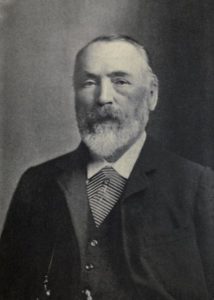
It is this episode of the killing of a large number of Matabele at the Umguza by the colonists whom they had come to kill, of which Mr. Labouchere has made so much capital lately, and which has enabled him to indulge in so many sneers against the white settlers in Rhodesia; his stock phrase being “that the natives are being shot down like game at a battue, with apparently as little danger to the shooters as to those killing hares and rabbits.” Now no one knows better than Mr. Labouchere himself the utter recklessness of such a statement if applied to the whole campaign, since it is evident that he is ever on the watch for every scrap of news emanating from Rhodesia, in the charitable hope of picking up something discreditable to the settlers or to the government of the Chartered Company, and he must therefore be well aware that the number of white men who have been killed and wounded in the various engagements and skirmishes that have lately taken place in Matabeleland is very considerable. But should any one who does me the honour to read my story be either a constant or a fitful reader of the pages of Truth, and be inclined to believe that the editor of that journal is correct in his oft-repeated assertion that the white men in Matabeleland have suffered an insignificant loss in their encounters with the natives during the present rebellion, I would ask such an one to turn to the Appendix at the end of this book, and look over the lists which I have there given both of the settlers who were murdered on the first outbreak of the rebellion, and also of those who have since been killed and wounded in battle. These lists, if compared with Mr. Labouchere’s statements, will, I think, prove to the most prejudiced that Truth—the everlasting Truth which we are told is great and will prevail—is one thing, whilst Mr. Labouchere’s Truth, sold at all the bookstalls at 6d. a copy, is quite another.

